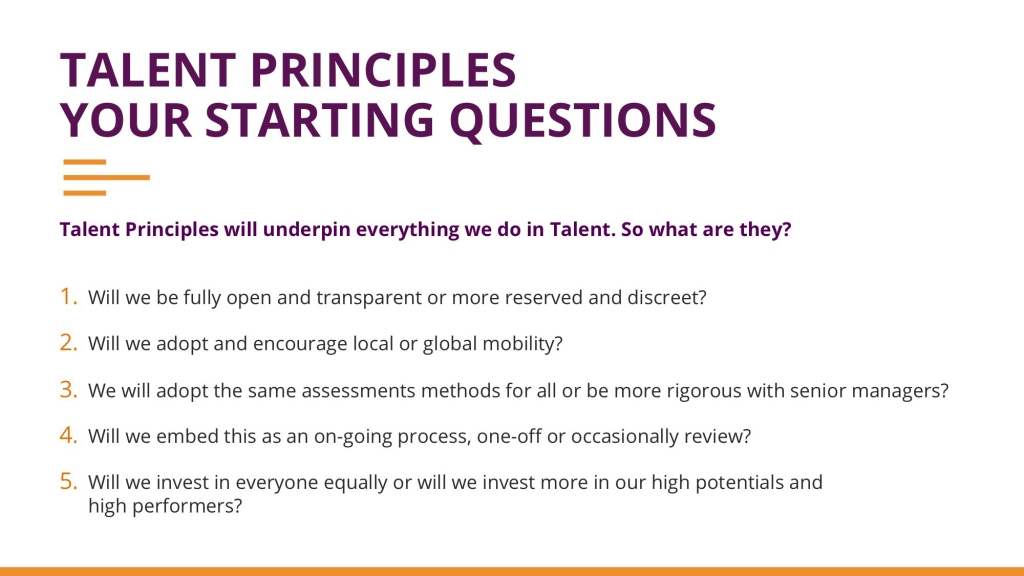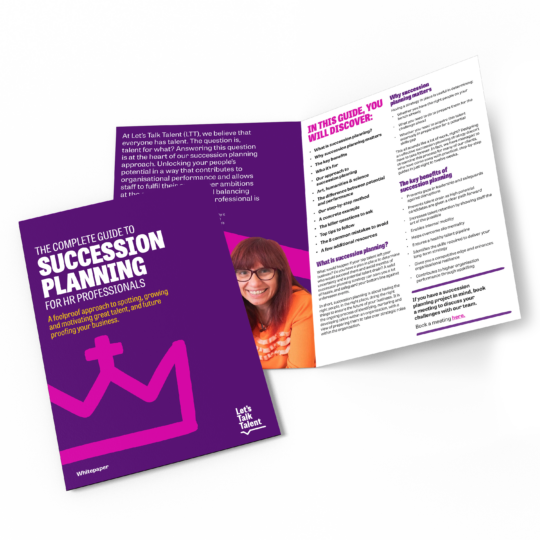How to define what succession planning means for your organisation with Talent Principles
Now more than ever, understanding your talent’s bench strengths, their skill gaps and your risk areas is of paramount importance. And as businesses everywhere are preparing to face this crisis head on, we have asked ourselves what would be one of the best ways to take some concrete action towards future-proofing your organisation. Succession planning came top of the list.
In previous blog posts, we’ve spent some time exploring the concept of succession planning and why it is key to delivering any business strategy. However, what our Talent Diagnostic Survey tells us is that whilst most of you know you should have a succession planning strategy in place, it’s clear the operational phase can be a struggle.
So it’s time to put aside the theory books and actually get down to some practical tips to get you going on the road to developing a kickass implementable plan. However, the key to getting to that stage isn’t magical fairy dust. It involves taking a moment and stepping back to figure out exactly what succession planning means for your unique business, its context and size, and the resources you may need to get started.
Whilst we can’t do the work for you, we can definitely point you in the right directions with a set of established tools which precisely blend science and art, but overall put the human first.
Below is a list of key questions you should be asking within your organisation in order to start determining what a successful strategy would look like for you. These are conversation starters and not only relate to succession planning but your whole talent management approach. We sincerely hope they generate many more follow up questions and open discussions. We also hope they help you establish the foundation for the implementation stage that will inevitably come next.
Question 1: Will we be fully open and transparent, or more reserved and discreet?
No, this isn’t a trick question. We all know the box we should be ticking is the open and transparent one. I mean, nobody sets up to have top secret conversations about career progression in dark conference rooms behind the water cooler. But whilst the goal would be to have open and honest conversations, the reality is that not everyone will have the means to implement this in a concrete way. Resources available, organisation size, your business strategy and gaps in your leadership capabilities may dictate discretion. Will you want to ensure that every employee has the same experience? Or maybe you are at the beginning stage of the process and want to start with one department as a test bed? This may require keeping things under wraps for a little while.
Open conversations can also be hard to handle, so ensuring that your leadership team is up to the task of dealing with difficult conversations about career expectations will be critical in answering this question. At Let’s Talk Talent, we believe in connecting people with purpose. And we know that sometimes means telling the truth, however hard it. Employees may have different views of their own skills, ambitions and career options within the organisation. Working with them to ensure they find their true purpose may require some additional coaching ahead of the succession planning rollout.
Question 2: Will we adopt and encourage local or global mobility?
Mobility is a great way to prepare future leaders for the next stage of their career. Having a fluid experience can be enriching and ensure your key talent get to understand the business in a much deeper way. It can also be a great talent attraction incentive. But not every organisation has international offices ready to welcome newcomers at the drop of a hat, so the definition of mobility may vary. Are you set up to move employees around, whether it is from country to country or from department to department? Do you have the support in place for those who choose to take global mobility head on? And what if the selected people are not up for uprooting themselves and their families? This specific element of the talent management toolkit requires a lot of structure, planning and emotional intelligence in its roll out and as such should be fully explored before those opportunities are offered to your people.
Question 3: Will we adopt the same assessment methods for all or be more rigorous with senior managers?
This is where you need to look at your most immediate talent gaps & future roles and assess your strengths, weaknesses and risks. For many organisations, the most immediate focus will be on the ‘Exec-2’ level, where the identified future leaders of the organisation will be assessed and receive more customised training in order to develop individual strengths quickly. This robust development plan will often include professional coaching, mentoring or even shadowing from existing board members. Whilst this may seem like a narrow focus for some, it’s important to make your own risk assessment and get going with implementing measures that will allow you to futureproof your business with the key people in place ready to do the right thing at the right time and with the right skills to deliver your strategy.
Question 4: Will we embed this as an ongoing process, one-off or occasionally review?
Again, whilst is may seem like the answer is an obvious one, succession planning may not be something you are able to maintain in the long run. Many will make initial plans, but to keep them alive is another kettle of fish. Should you even get started then if you know this exercise will not be reviewed on an ongoing basis? Heck yes!
The key here is to understand from the start whether you are doing this because of a particular one-off need, such as a change to your operating model, or whether it will become part of your talent management rhythm. As with everything else, your strategy will be determined by your capacity to deliver it over time. And again, there are no wrong answers here. Even a single bite exercise brought on by a one-off organisational event can be the answer to your current needs. It’s just important to know from the get-go where you stand so you can set appropriate expectations with your talented many and plan next steps based on the frequency you are able to maintain.
Question 5: Will we invest in everyone equally, or will we invest more in our high potentials and high performers?
We’ve mentioned before that we truly believe everyone has talent. As such and in an ideal world, all staff would receive customised career planning training and advice in order to prepare for the next stage of their professional life. But whether it’s due to limited budgets, resources or other factors, this is rarely the case. So understanding your limitations is the first step in setting up your succession planning strategy.
Are you able to offer one-to-one coaching? If so, who would benefit from it the most? Do you need to set up specialist training for your highly trained experts? Would you have budget to invest in mentoring for your high potential employees? What level of effort can you invest in this and how long can you keep it going for? These are all questions that will need to be answered in order for you to develop a consistent and effective policy for your various staff groups.

Just getting started
The purpose of our five succession planning questions isn’t to highlight where your resources are lacking, what your limitations are or any bias in training a particular group of employees. At Let’s Talk Talent, we believe in getting shit done, and whilst embedding and maintaining a whole new initiative can be daunting, the main thing to remember is that there will never be a perfect time to get started. Rarely will organisations have the resources to implement and sustain a global succession planning policy for all employees on an ongoing basis. But in the meantime, there are definitely concrete things you can do to get things started. Regardless of whether you are only able to start with a discreet limited initiative or have resources to offer coaching only to a select few, any efforts aimed at ensuring the delivery of your business strategy in the long-term should be applauded. So do use the questions above to generate discussions, get really clear on what succession planning could involve for you and your unique business, and get going with the implementation phase of your very own customised plan.
And if you would like some additional tools to get there, have a look at our succession planning whitepaper, which covers predictive succession planning in more depth.

